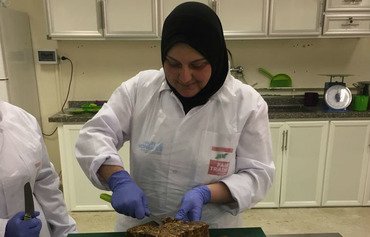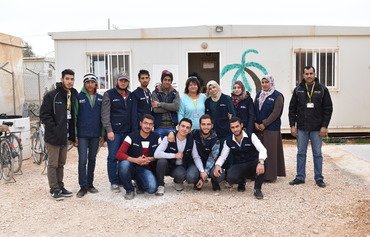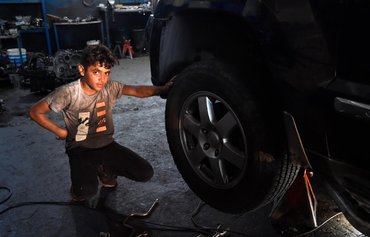Seventy teenagers from Syria, Iraq, Palestine and Lebanon recently spent three months together in Beirut learning how to overcome their differences through a photography and writing workshop.
The project, called "Soura wa Hikaya" (A photo and a story), was designed for young people between the ages of 14 and 18. The teenagers revealed what they had learned during a week-long exhibition of their work at al-Madina theatre on Beirut's Hamra street that concluded February 9th.
Through the workshop, Lebanese nonprofit Zakira and UNICEF sought to forge social bonds between refugee and host communities and help the participants recognise the destructiveness of sectarianism.
At the closing exhibition, the teenagers displayed photographs and stories that revealed the reality of their lives, with some shedding light on their experience as refugees and the tragedies they have lived and witnessed.
Aya al-Khalaf, 16, a refugee from Aleppo, showed photographs of Syrian child labourers working to support their families instead of going to school.
She photographed and wrote about Salam, 13, who works at a construction site carrying heavy bags of cement and stones; Ahmed, 12, who works at a popular market; and Yamen, 10, a worker at a hookah café.
Al-Khalaf told Al-Mashareq she used the skills she acquired to "cast a spotlight on Syrian child labourers and present a true picture of the suffering of refugees".
"I wanted to let everyone know that they are the biggest victims of war," she said. "Just like Yamen who works at a hookah café, they are trapped between the rock of displacement and hard place of poverty and child labour."
Overcoming prejudice
Al-Khalaf said she took part in the project as she was determined "to assimilate and integrate within my Lebanese environment and get acquainted with others".
"My family and I have been living in the Burj al-Barajneh camp since our displacement from Aleppo," she said. "I did not mingle with the Lebanese because I thought they were racists."
The project has helped her realise "they are not racists, they just do not know the reality of our circumstances", she said, adding that "we became acquainted with each other and realised that we are alike, even in our worries".
Iraqi refugee Fayd Bakhos Keryo, 18, whose lens captured images of Syrian children, told Al-Mashareq the project gave him space to open up to others.
Keryo said he arrived in Lebanon after the "Islamic State of Iraq and the Levant" (ISIL) forced him to flee his village in Qaraqosh in northern Iraq, along with many others.
"I kept to myself for two years, afraid of interacting with others," he said.
"The project introduced me to people of my generation and I left it a different person. I now accept others and differing opinions. I freed my soul, which was imprisoned, as I depicted it in the exhibition."
Lebanese participant Hadi Mgharbel, 18, showed photographs of Jal al-Bahr Palestinian refugee camp in the Lebanese city of Tyre.
"We saw [Palestinian refugees] as a source of terrorism and extremism, and they saw us as racists," he told Al-Mashareq, adding that he sought through his photographs to dispel that perception.
"There was a chasm between us," he said. "But today, we have come together and bonded, and have realised that we are alike."
Investing in Arab youth
"We all know that investing in youth in the Arab world is an urgent priority for laying durable foundations for stability," said Tanya Chapuisat, UNICEF’s representative in Lebanon.
"We should note what is in their viewfinder, what worries them, and what they address when they write. Because that is where the answers are to be found," she said at the opening of the exhibition on February 3rd.
Soura wa Hikaya aimed to harness the potential of teenagers and address their issues through dialogue and communication, to keep them from being drawn to terrorism and extremism, said Zakira president, photographer Ramzi Haidar.
"It is proven that this age group is being targeted to be deceived, especially as there are some among them who do not attend school and do not receive proper guidance," he told Al-Mashareq. "We gave them space for hope, joy and self-reliance to discover themselves."
The project's workshops taught the participants how to use a camera, photography techniques, news writing and editing, and how to use social media, he said.
"They met people from different social backgrounds and built relationships based on common issues that concern their generation," he added.
Soura wa Hikaya was launched last year to enhance the skills of marginalised youth and strengthen the bond between refugees and host communities, Haidar said.
Since then, he added, more than 70 young men and women have been empowered to become local journalists by learning how to prepare news reports and take photographs.
The workshops revealed the extent of their ambition, social and political awareness and ability to make a positive change in their communities, he said.
"Our project succeeded, and they transcended class and social differences," he said.
"We gave them an opportunity to talk about diversity, integration and challenges, so they could address them through dialogue, and we continue to give the same opportunity to others living under similar circumstances," he said.

![Iraqi refugee Fayd Bakhos Keryo, who participated in the 'Soura wa Hikaya' workshop, took this photograph of Syrian refugee children in Lebanon. [Photo courtesy of Fayd Bakhos Keryo]](/cnmi_am/images/2017/02/09/7189-Lebanon-refugee-children-600_384.jpg)






